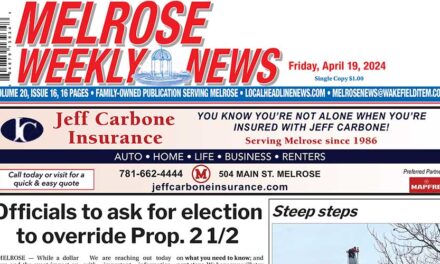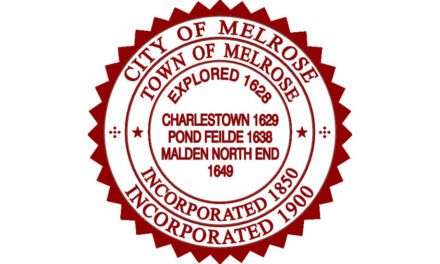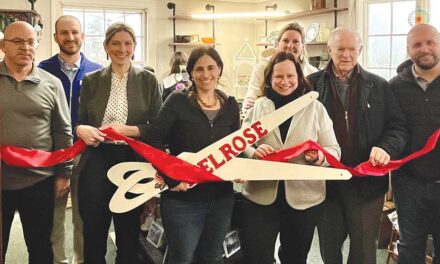MELROSE — An important downtown business owner is telling Mayor Robert J. Dolan this week to forget dumping $5.3 million into Melrose High and instead concentrate on more parking spaces.
Steven Trulli, co-owner of Whittemore Hardware, writes in a letter that he disagrees with a new technology center at the city’s flagship school as the way to keep students in Melrose through grade 12. He says, “Instead of throwing money at a pipe dream, put it towards a cause you can win. Improve the parking in downtown. Given the hundreds of customers that have expressed their dissatisfaction about accessible parking, I am sure I can speak for many downtown businesses when I say that I have lost many sales due to a lack of parking. The lost sales due to a missed trip into the downtown are permanent. Many of these trips will be made to the mall instead.
“We must think like a mall. A diversity of businesses featuring a clean, inviting, event-filled experience that promotes cross-selling from business to business. Alleys leading to parking areas should be refurbished with lighting, flowers, and brick walkways. A good starting example of this is alley next to Turners Seafood. Outdoor malls have been popping up in surrounding towns and have had great success. Market Street in Lynnfield, and Wayside in Burlington are just two examples. Developers have built simulated downtowns with parking. We have the shops, we have the restaurants, and we need the parking.
“The 1989 parking study shows long-term parking in public timed spaces accounts for a conservative 504 missed parking opportunities per day. That’s 157,248 missed parking opportunities in a shopping year. Providing each potential parker spent $20 in the downtown, it would increase spending by $3.2 million. The American Independent Business Alliance (AMIBA) found that the multiplier effect of spending money locally recirculates far greater percentage of revenue locally. The multiplier impact comprises of three elements. Direct impact is spending to operate the business, including inventory, utilities, and employees’ pay. Indirect impact occurs when a business spends money at other area businesses. The induced impact happens when a business owner or employee spends their pay within the local economy. The total impact of the multiplier is that $.68 of additional local economic activity is generated for every dollar spent at ten local businesses.
“The newest Melrose parking study prepared by the Office of Planning and Community Development (OPCD) was conducted in May of 2011 and presented in March 2012. The city has initiated some of the short-term recommendations. They’ve increased time limits in certain parking lots, implemented a snow removal plan, and reconfigured existing parking lots to add several more spaces. The study used utilization rates for an average weekday and weekend day. With those utilization rates and the inclusion of private parking lots, they concluded that more parking spots were not necessary. I think if you were to ask any employee or customer in the downtown, they would certainly disagree.
“The scientific process, how studies like this one are structured, conducted, and then reported are frequently debated. These debates increase the public’s skepticism about the data. Studies like this one use popular methods for determining off-street parking from other locations. Including the adoption of another community’s benchmarks, without thoughtful consideration of local differences. Tracking this dialogue is what prompts contradiction and revision.
“Our elected officials are very sensitive to the parking complaints. With a reluctance to make any bold initiatives, they were happy to accept a study that was conducted with a political milieu and that proved both easy and inexpensive to implement.
“Mayor Dolan expressed a concern over the pressures of rent increases yet suggested reviewing the lower than average residential and commercial tax rates. Well which is it? This is an oxymoron. Renters and landlords do what they can to try to keep costs down. They can negotiate terms with their insurers and take advantage of state energy programs to conserve energy use, but the one thing they can’t control is real estate tax. And real estate tax will always be passed down to the tenant increasing their rent. Therefore if the mayor were truly concerned about rent costs then he would not suggest increasing residential and commercial tax.
“Instead of considering higher taxes and more school spending as a solution to make this city thrive, consider supporting what works. Propose a plan to increase parking in the downtown.
“I proposed numerous times to the mayor and other politicians that the city should buy Deering Lumber, even if that meant through the unpopular eminent domain. This is a dirty word in Melrose and in most communities. However, this is the last large piece of property left in Melrose. It would be an invaluable addition to the city. The police department could be moved there freeing up that valuable piece of downtown property. The current police station combined with the building next door, now part of TD Bank, would be a great place for a parking lot or a 3 story parking garage with a lower level parking. This would provide plenty of additional parking at Deering for downtown business employees to park at a reduced rate. There would be parking for out of town train riders to use producing another area of revenue.
“The city recently rezoned the street from Deering Lumber to Franklin St this year for more varied uses, one of which is assisted living. It is not a coincidence that an assisted living corporation has had a pending offer on that property for a couple of years. That property could have many more positive uses for the city. Some say that it’s too late for the city to buy Deering. But is it? Here we go back to those dirty words, eminent domain. The $5.3 million not spent on a technology center could be used to buy Deering or buy up property around the downtown district piece-by-piece adding to the parking inventory. Take a cue from the YMCA. They should be congratulated and thanked for having the gall, and the insight for spending the money they did to buy up the two properties behind them, adding parking for their customers.
“For the Melrose business district to thrive it must have parking! Or you can just go to the mall,” Trulli concludes.




